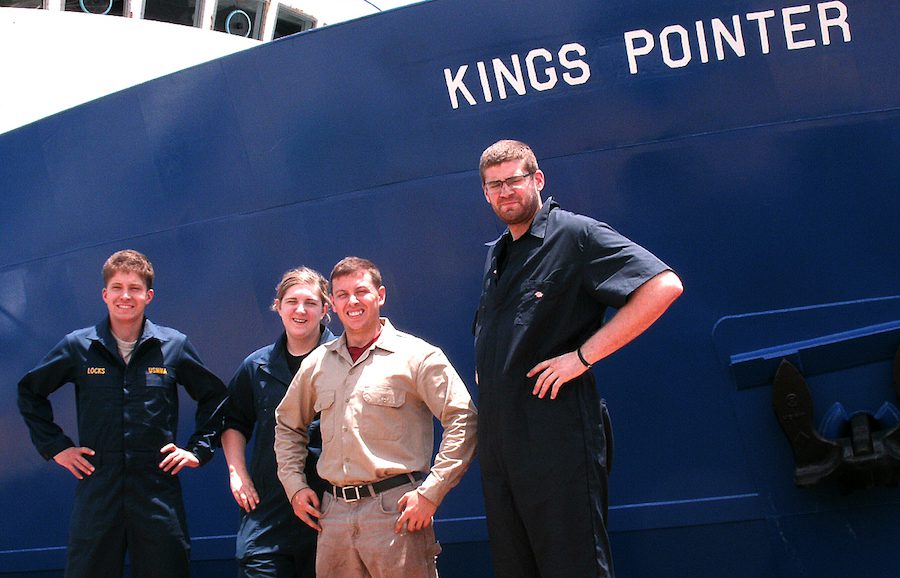“Sea Year” for midshipman is a chance for self-directed study and growth. Alumni, myself included feeling that being a cadet onboard of working merchant vessels allows an opportunity to gain real work experience, a feel for what a career in the merchant marine could be like, the value of hard work, and a sense of personal responsibility. As a cadet, you and only you are responsible for finishing your projects and turning them in completed. You are responsible, also, for failing to do so, irrespective of the vessels that you were on – that experience is priceless.
Unfortunately, on the
16th of June USMMA stated that “While the Department of Transportation (DOT), the Maritime Administration (
MARAD), and the United States Merchant Marine Academy (USMMA) have made consistent efforts to address sexual assault and sexual harassment on campus over the last few years, we’ve grappled with appropriate means of extending these efforts during “Sea Year” when the Midshipmen are off campus training on working U.S. merchant marine vessels. The safety of these young women and men are our highest priority, and the USMMA is standing down having Midshipmen serve on these vessels until it is assured that their training will be carried out in a safe environment.”
Harassment and Assault in the workplace have been illegal in the United States since The Civil Rights Act of 1964 – this includes on U.S. Vessels. Unfortunately, criminal cases of these kinds do happen regardless of location.
Even two years ago during a
meeting of the U.S. Merchant Marine Academy Board of Visitors assault issues were referenced as a serious concern both on and off campus. Why if it was a concern then, wait until now to bring it to the attention of not only the US Merchant fleet – but to the maritime community as a whole?
This action is against the entire mission of the Academy “To educate and graduate licensed merchant mariners and leaders of exemplary character who will serve America’s marine transportation and defense needs in peace and war.” It seems as if in one day they have accused all American mariners of being potential criminals and sex offenders. It seems as if of the ships of the world are unsafe for the four years that midshipman spends in training, but not for the class of 2016 that has just walked out of the gates – and is even now joining their first ships as officers of the deck and engine departments.
It appears that after speaking with a handful of alumni from classes of ’81 through ’15, none would have considered suspending the training of midshipman to end harassment and assault in the industry. People don’t change their behavior overnight – and it has been a long road since 1964
– how are they going make all the U.S. Flag Vessels “both safe and respectful”
– if all the measures up to now have failed to do so?
In my opinion, I don’t believe that harassment and assault on both men and women are much more frequent on board a vessel than in any other environment. I think that there are particular challenges to the maritime environment. Because it is an enclosed community for prolonged periods without external influence or people. But in general, I believe that criminals and people with bad behavior can be found just as often ashore in any working environment.
In the U.S. and on U.S. Flag Vessels “w
hen an employer receives a complaint or otherwise learns of alleged sexual harassment in the workplace, the employer should investigate promptly and thoroughly. The employer should take immediate corrective action by doing whatever is necessary to end the harassment, make the victim whole by restoring lost employment benefits or opportunities, and prevent the misconduct from recurring. Disciplinary action against the offending supervisor or employee, ranging from reprimand to discharge, may be necessary. Generally, the corrective action should reflect the severity of the conduct. – Policy Guidance on Current Issues of Sexual Harassment (1990)
On the
14th of June, a bill was enacted into law which requires the Maritime Administrator to “convene a working group to look at methods to improve the prevention of, and response to, any sexual harassment or sexual assault that occurs during a Cadet’s Sea Year experience with the United States Merchant Marine Academy.” Within 90 days after the bill went into force.
The bill also states that the working group should “assess whether the United States Merchant Marine Academy should continue with sea year training on privately owned vessels or change its curricula to provide alternative training; and assess how vessel operators could ensure the confidentiality of a report of sexual harassment or sexual assault in order to protect the victim and prevent retribution.” What the bill doesn’t appear to require is the cancellation of sea year during the time of these assessments.
While the U.S. has not ratified the Maritime Labour Convention of 2006, it has adopted parts through the STCW code into the CFR’s. But,
according to the USCG “U.S. vessels that cannot demonstrate compliance with the MLC may be at risk for Port State Control actions, including detention when operating in the port of a ratifying nation.” if they are not in compliance with MLC 2006.
Whatever the reason that USMMA has suspended Sea Year training, it is a shame both for the opportunity loss of the midshipman and the lack of trust that has been demonstrated by the Academy of all of the U.S. Mariners. As an Alumnus, it is a sad moment in time.
For more information about harassment and assault laws in the U.S. see:
- https://apps.americanbar.org/buslaw/blt/2008-09-10/tremblay.shtml
- https://www.eeoc.gov/policy/docs/harassment.html
- http://apps.americanbar.org/abastore/products/books/abstracts/5190452%20intro_abs.pdf
- http://ojp.gov/ovc/publications/infores/VictimsRightToPrivacy/pfv.html











